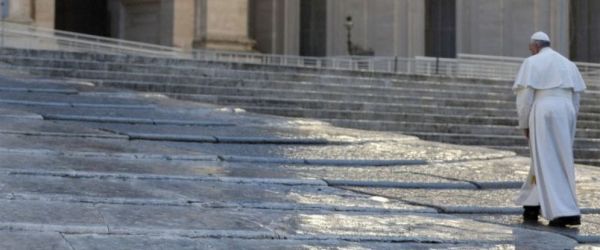This Sunday’s Gospel passage (cf. Mk 5:21-43) presents two miracles performed by Jesus, almost describing them as a type of triumphal march toward life. Initially the Evangelist speaks about a certain Jairus, one of the rulers of the Synagogue, who approaches Jesus and beseeches Him to go to his home because his 12-year-old daughter is dying. Jesus agrees and goes with him; but, along the way, word arrives that the girl is dead. We can imagine that father’s reaction. But Jesus says to him: “Do not fear, only believe” (36). When they arrive at Jairus’ house, Jesus sends out the people who were weeping — there were also women mourners who were wailing loudly — and He enters the room with just the parents and the three disciples, and speaking to the dead girl He says: “Little girl, I say to you, arise” (v. 41). And immediately the girl gets up, as if waking from a deep sleep (cf. v. 42).
Within the narrative of this miracle, Mark adds another: the healing of a woman who suffers from a haemorrhage and is healed as soon as she touches Jesus’ garment (cf. v. 27). Here what is striking is the fact that this woman’s faith attracts — to me the word “robs” comes to mind — the divine saving power that is in Christ, who, feeling that “power had gone forth from him”, tried to understand who it was. And when the woman, with much shame, comes forward and confesses the whole truth, He tells her: “Daughter, your faith has made you well” (v. 34).
It is a matter of two interlocking narratives, with a single core: faith; and they show Jesus as the wellspring of life, as the One who restores life to those who trust fully in him. The two protagonists, that is, the little girl’s father and the sick woman, are not disciples of Jesus yet they are satisfied through their faith. They have faith in that man. From this we understand that all are permitted on the Lord’s path: no one should feel as an intruder, an interloper or one who has no right. To have access to His heart, to Jesus’ heart, there is only one requirement: to feel in need of healing and to entrust yourself to Him. I ask you: do each of you feel that you need to be healed? Of something, of some sin, of some problem? And, if you feel this, do you have faith in Jesus? These are the two requirements in order to be healed, in order to have access to his heart: to feel in need of healing and to entrust yourself to Him. Jesus goes to discover these people among the crowd and removes them from anonymity, frees them from the fear of living and of taking risks. He does so with a look and a word which sets them back on the path after much suffering and humiliation. We too are called to learn and to imitate these freeing words and this gaze which restores the will to live to those who lack it.
In this Gospel passage the themes of faith and of new life, which Jesus came to offer to all, are intertwined. When he enters the house where the dead girl lies, he sends outside those who are weeping and making tumult (cf. v. 40), and he says: “The child is not dead but sleeping” (v. 39). Jesus is Lord, and before him physical death is like a dream: there is no reason to despair. Another death is the one to fear: that of the heart hardened by evil! Yes, we should be afraid of that one! When we feel we have a hardened heart, a heart that is hardened, allow me to say, a mummified heart, we should be afraid of this. This is the death of the heart. But sin too, the mummified heart too, is never the last word with Jesus, because he has brought us the infinite mercy of the Father. And even if we have hit rock bottom, his tender and strong voice reaches us: “I say to you, arise!”. It is beautiful to hear that word of Jesus addressed to each one of us: “I say to you, arise! Go. Stand up. Take courage, arise!”. Jesus restores life to the little girl and restores life to the healed woman: life and faith to both.
Let us ask the Virgin Mary to accompany our journey of faith and of concrete love, especially toward those who are in need. Let us invoke her maternal intercession for our brothers and sisters who are suffering in body and in spirit.
[Pope Francis, Angelus 1 July 2018]












